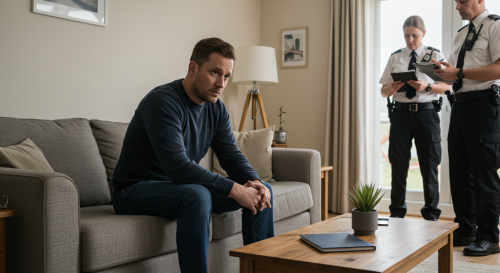Can You Shoot Someone in Self-Defence in England: Navigating the Laws, Potential Defences, Consequences, and the Imperative of Legal Advice

Can You Shoot Someone in Self-Defence in England: Navigating the Laws, Potential Defences, Consequences, and the Imperative of Legal Advice
In England, the use of force in self-defence, particularly involving a firearm, is governed by complex legal statutes and principles. Understanding the legalities, possible defences, and consequences of such actions, as well as the critical importance of seeking legal advice, is essential for anyone facing this grave situation.
The Legal Framework of Self-Defence

The law in England allows for the use of reasonable force in self-defence, the defence of another person, or the protection of property. This is codified in the Criminal Law Act 1967 and further clarified by case law.
However, the term ‘reasonable force‘ is subject to interpretation and varies based on each specific situation.
Using a Firearm in Self-Defence
- Firearm Ownership Laws: England has strict laws regarding the ownership and use of firearms. Legal possession of a firearm itself requires meeting stringent criteria.
- Assessment of Reasonable Force: In cases where a firearm is used in self-defence, the key question is whether the force used was reasonable under the circumstances. This assessment considers the perceived threat and whether the response was proportionate.
Potential Legal Defences

- Immediate Threat: The defence can be strengthened if there is an immediate and credible threat to personal safety.
- Proportionality of Response: The force used must be proportionate to the threat. Excessive force, beyond what was necessary to neutralise the threat, may not be justifiable.
- Instinctive Reaction: The law recognises that in the face of an immediate threat, a person’s response may be instinctive rather than calculated.
Consequences of Using a Firearm in Self-Defence
- Criminal Investigation: Any use of a firearm in self-defence will likely lead to a criminal investigation to determine the legality of the action.
- Potential for Prosecution: If the use of the firearm is deemed excessive or unreasonable, it can result in criminal charges, including manslaughter or murder.
- Psychological and Social Impact: Beyond legal consequences, using lethal force can have significant psychological and social implications.
The Importance of Seeking Legal Advice

- Complex Legal Landscape: The laws governing self-defence and the use of firearms are intricate and can be subject to differing interpretations.
- Legal Representation: In the event of an investigation or charges, having legal representation is crucial. A solicitor can provide expert guidance and defend your actions in court.
- Navigating the Investigation Process: A solicitor can guide you through the police investigation process, ensuring your rights are protected.
- Formulating a Defence Strategy: If charged, a solicitor will help formulate a defence strategy, considering all aspects of the incident and applicable laws.
- Mitigating Risks: Professional legal advice can help mitigate the risks of severe legal consequences.
Conclusion: Can You Shoot Someone in Self-Defence in England

The use of a firearm in self-defence in England is a matter of serious legal and ethical consideration. The law does provide for the right to self-defence, but the application of this law, especially when a firearm is involved, is highly complex.
Given the potential for significant legal and personal consequences, it is imperative to seek legal advice from a qualified solicitor. They can provide clarity on the legalities, represent your interests during investigations and potential court proceedings, and offer the best chance for a fair and just outcome.
Notice: Informational Content Disclaimer
The content provided on this website, including articles, blog posts, and other informational materials, is intended for general informational purposes only. It is not intended as, and should not be considered, legal advice.
Visitors to this website should be aware that the information presented here is not a substitute for seeking legal advice from a qualified solicitor or legal professional. Each individual's legal situation is unique, and the information provided may not be applicable to specific circumstances.
If you require legal advice or have specific legal questions, we encourage you to contact us directly. Our experienced team of solicitors is here to assist you with your legal needs and provide tailored advice to address your concerns.
Please be advised that any communication through this website, including the use of contact forms or email, does not create a solicitor-client relationship. Confidential or time-sensitive information should not be sent through this website. To establish a solicitor-client relationship and discuss your legal matters in detail, please contact us for a consultation.
We strive to provide accurate and up-to-date information, but we make no representations or warranties regarding the accuracy, completeness, or suitability of the information contained on this website. We shall not be liable for any reliance placed on the information provided herein.
Thank you for visiting our website. We look forward to the opportunity to assist you with your legal needs.




